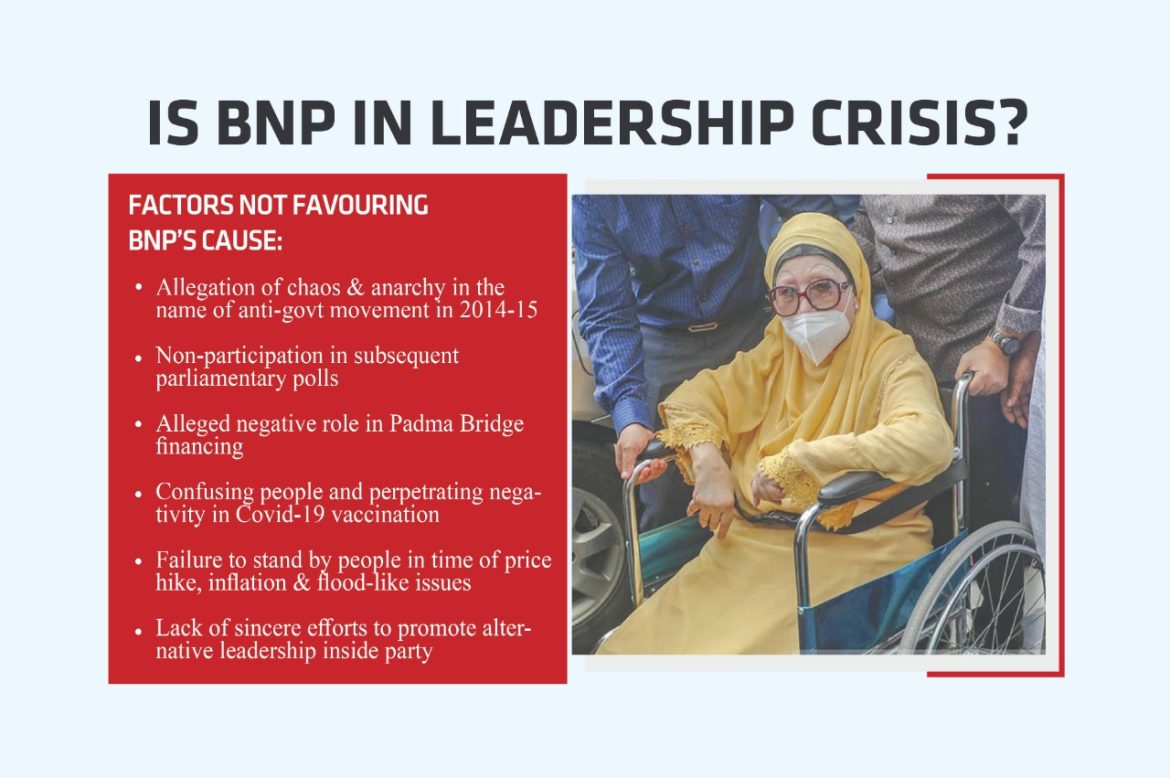BNP’s best bet for coming to power through normal constitutional and elective process, some day, would be through copying and practicing of the Westminster-type model of the shadow government. BNP can prepare a new breed of leaders, who would evoke faith and trust in them among the people. The new leaders can be drawn from among persons with required capacity, specialist knowledge and due experience whom the people can trust to lead them and pose as a viable alternative to the ruling Awami League, write SHEIKH MOHAMMAD FAUZUL MUBIN, ENAYET RASUL BHUIYAN and NASHIR UDDIN
In Bangladesh, political divide turns far and wide unlike other democracies depending on issues, inter-ests and relevance wherein leadership plays a key role. In fact, our political system is structured such a way that it’s not essential to present policies, actions and readiness, to present a prepared and worka-ble alternative to people in the event of a major failure of the incumbents to govern effectively. It be-comes too vital that the main opposition can be trusted to take over the tasks of governing efficiently and effectively.
CAN KHALEDA ZIA CLING ON?
A healthy and physically vigorous Khaleda Zia cannot be expected magically to be reborn to revitalise and freshly inspire the party and its followers. In other developed countries and democracies around the globe, not so much about leadership qualities or issues and other aspects to providing effective governance are issues to worry about. The triumphant party in the election, on winning, may be found ready to provide dependable and effective governance right after the election results get announced.
Modelled after the British parliamentary tradition, the shadow government and other attributes to ensure viable and effective continuity both in political and governmental terms, there are hardly scopes in such systems for new governments to fast buckle down and show pathetic inabilities in the matter of governance.
The members of the shadow government had been closely following issues of national importance from long before the general elections and are well versed on how and what to do from their own to do better or at least not to slip into a pitfall of misgovernance or ineffective governance.
But closer to home in Asia, including our own Bangladesh, do we see the advance preparation of op-position parties to assure the people about a measure of dependability to go on governing efficiently notwithstanding the rise and fall of governments arising from election outcomes? In most of Asia, in-cluding Bangladesh and India, we see family, cult, personality, and charisma etc. playing greater roles than preparation of parties in advance to automatically provide effective leadership.
OTHER OPTIONS AND BNP’S STATE OF AFFAIRS
Gazing at the crystal ball, it is not difficult to forecast what lies ahead for opposition politics of BNP as the next general election date gets nearer. This party is unlikely to re-examine or reform itself quickly centring on the ups and downs of Begum Zia’s health. Even if she recovers, which her party men and most others in the country wish her, she is unlikely to be fully fit despite her current health conditions. But there would be unlikely pressures from within the party asking her to step down or to limit her active role in the party affairs. Embroiled in such a complicated situation, the BNP is unlikely to get the strength of a party with new and vigorous leadership.
Tarique returning home from London and taking the mantle of leadership from her mother would be a perfect solution. But this is most unlikely as he faces warrants of arrest in several cases on return. In that situation, BNP would be like sailing without radar on very rough seas come the election and its humiliation in it would be somewhat predestined.
Before Begum Zia’s recent heart attack, it was heard that Begum Zia was thinking about giving up much of her powers and functions to the now-deceased Barrister Moudud Ahmed. Surely, this would be also an ideal choice to be liked especially by the intelligentsia and veteran party workers. They could expect to broadly unify the party’s various factions and rally it round the illustrious Barrister, who had all in his background to put BNP formidably as a serious challenger to the Awami League in a probable post-Khaleda era. But the death of Moudud Ahmed must have also crushed such hopes.
As for the other senior leaders in BNP, none met his pedigree or abilities. The present Secretary Gen-eral of the party Miza Fakhrul Islam Alamgir and some other ex-ministers of the BNP era are generally in frail health conditions too. In sum, the BNP faces a leadership vacuum which it would find hard to fill in the months ahead. The ongoing city corporation elections are also injecting new uncertainties in BNP’s posturing. The leaders of BNP will have to fast decide whether they should stick too rigidly to their decision of boy-cotting the general election or take a chance on seeing the present Election Commission (EC) more fairly tilted towards allowing the holding of free and fair elections. In that situation, come December 2023, the BNP might face ‘hard choices or temptation’ to join the election fray. Such a development, of course, will change everything.
The country would be plunged into election politics for a while and the BNP leaders would need all their acumen and skills to make an impressive showing in the election regardless of whether they can show enough strengths to unseat the incumbent Awami League from power or not.
EXPECTATION FROM BNP
Let’s discuss as to what people do really expect from the BNP? A broader view in this regard is that this party needs to rehabilitate itself in the eyes of the people. It presently has an image among people in general for its continuous fiery actions in 2014-15 and 2017-18 to desperately try and unseat the government.
Normal life and living was negatively affected in that period, but the BNP could not achieve its target. Nor does it seem that the people have any more appetite this time to support such aggressive politics from BNP to be able to achieve its goal. People would generally want BNP to pursue its goal in a different way. They would want BNP not to once again paralyse the country on the plea of movement, but to present its case peacefully to the people. That way has more chances of gradually winning over more mass support for the BNP in the long run.
Without being seen as a party of violence and unrest and depending essentially on the tactics of un-rest to achieve its goal, the BNP would find greater sympathy and support for it in the people’s minds. BNP needs to aim for a complete rehabilitation in people’s minds and awareness. In 2018 when BNP had launched its ‘all-out movement’ against the government, it is not that people generally hated this course of action.
BNP also could sell it off as a desperate move on its part, backed by people’s participation, in response to a government that had turned totalitarian and dictatorial and bent on alleged election rigging. But after some months, the fury that the BNP wanted to whip up in its favour appeared to lose its steam. People were for reviving normalcy and to that end spontaneously ignored BNP’s further call for hartals and other action programmes. Thus, the BNP movement in 2018 gradually petered out from lack of support.
Government was able to hold the general elections in 2018 with all its shortcomings, but the BNP, even after forming election alliance with ‘like-minded’ parties making veteran politician and noted jurist Dr Kamal Hossain their alliance leader, was unable to mount any serious challenge to the same as people were too weary and had no stamina for further movement. Now, BNP would be faced with a similar choice as the countdown for the next general election, ex-pected to be at the fag-end of 2023, is slowly starting. What should it do? Will it repeat the past poli-cies to court failures again or try newer and better strategies?
BNP leaders need to realise that two things are swallowing all vain prides. First, they need to admit in their minds that the ruling party is seen much differently in people’s conception these days. The finish-ing of the Pama Bridge project in time together with solid progress made towards completion of a number of nationally important mega projects have given a shine to the ruling party’s image. As a matter of fact, ranks and file of the people are not for any unstable conditions in the country now; they seek only stability and continuity.
REHABILITATING PARTY IN PEOPLE’S MINDS REMAINS KEY
In view of the current realities, it would be pragmatic for the BNP leadership not to emotionally or pas-sionately go for past policies and the failed ones. They should opt for rehabilitating the party in the minds of the people for the midterm and the long term. In that way, they may get sufficiently rehabili-tated in people’s conception and through turn of events people may once again choose them or accept them as a viable alternative to the present ruling party. Therefore, the BNP would be doing bet-ter building up its electorates for the midterm and long term rather than courting uncertain adven-tures in the short term and flopping again.
This preparation for looking like a viable alternative to the Awami League involves following the shadow government example. In the UK, for instance, the shadow governance essentially means always preparation by the political opposition so that people can be assured that they would not suffer from any governance gaps should the incumbents get defeated in elections or get unseated by any tumult. With this, in the UK, people can keep faith in the new government whether a Tory government wins or gets defeated in the polls or a Labour government wins and vice versa.
For example, all the ministries can count on the preparations taken by able persons in the shadow Cabinet to bring their knowledge and skills in the new administration. For example, the Ministry of Fi-nance would benefit from preparations taken well in advance by the shadow government’s counter-part, who has been keeping an eye on the lapses of his or her predecessor and meanwhile forming policies and strategies to utilise once called upon to do so.
Same would be the advance preparations in all other line ministries without any exception meaning, on the whole, a shadow government remains fine-tuned to take over efficiently from an exiting government or government going out.
The BNP’s best bet for coming to power through normal constitutional and elective process, some day, would be through copying and practicing of the Westminster-type model of the shadow government.
While this might not win BNP the next general election for the present overriding popularity of the incumbent government in Bangladesh, it can surely make a successful bid for power in the ‘future’ by showing that it is a responsible party that can wait for its turn legitimately and soberly. In the mean-time, following the much-acclaimed shadow government model, it can prepare a new breed of leaders, who would evoke faith and trust in them among the people.
The new leaders can be drawn from among persons with required capacity, specialist knowledge and due experience whom the people can trust to lead them and pose as a viable alternative to the ruling Awami League.
In fine, the BNP is a large mass-based political organisation. It has many talented leaders and activists. The present breed of BNP leaders, who are presently health-barred from clinging on to leadership po-sitions, should find out these talented breed of personalities and groom or encourage them to take over as the hard core of its future leadership.
BNP LEADERS WHO MAY SUCCEED KHALEDA ZIA
Tarique Rahman
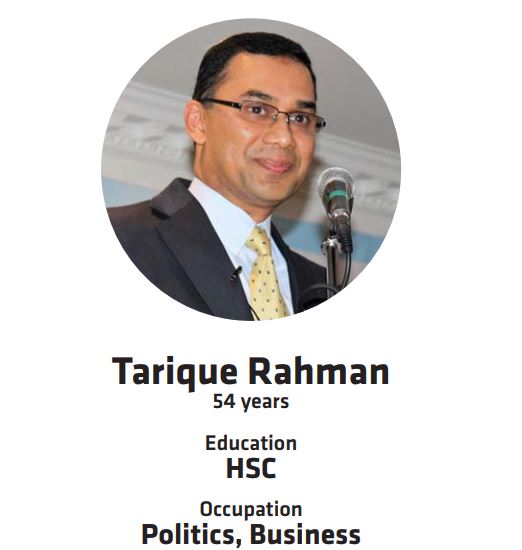
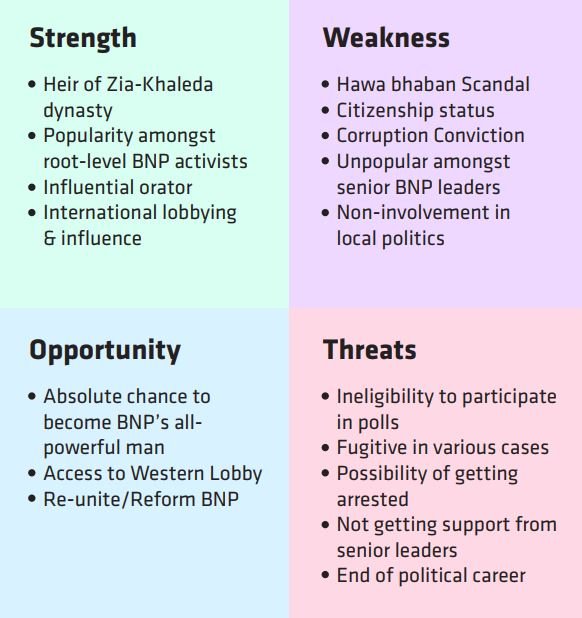
Family Background
Tarique Rahman belongs to a Bengali Muslim family and his ancestral home is in the village of Bagbari at Gabtali in Bogra District. His father, Ziaur Rahman, was the 7th President of Bangladesh, and his mother, Begum Khaleda Zia, was the 10th Prime Minister and first female Prime Minister of Bangladesh.
Political Career Highlights
Tarique started his political career as a primary member of the Gabtali Upazila BNP 1988 in Bogura. He actively assembled support for the party during the national elections of 1991, when the transition was taking place from the autocratic ruling to the democratic government. He gradually became the Senior vice president and now he is performing as acting Chairperson of BNP.
Money laundering case
On 7 June 2007, a money laundering case was submitted against Tarique and his friend and business partner Giasuddin Al Mamun by the Bangladesh Anti Corruption Commission at a court in Dhaka. In a verdict given on 18 November 2013 by the court, he was acquitted in the case involving BDT 20.41 crore.
On 21 July 2016, Rahman was found guilty by the Bangladesh High Court overturning a lower court verdict that acquitted him earlier. He was sentenced to seven years of imprisonment and fined Tk 20 crore by the Court. His money laundering case was the first case in the country’s history where an FBI agent testified and produced evidence against a defendant in Bangladeshi court.
On 3 November 2008, a leaked US Embassy cable said that the embassy in Dhaka believed Tarique was “guilty of egregious political corruption that has had a serious adverse effect on US national interests’
2004 Dhaka Grenade Attack Case
On 10 October 2018, Tarique was sentenced to life in prison for the case of 21 August, 2004 grenade attack on the rally of Bangladesh Awami league in Dhaka.
Dr. Zubaida Rahman (50 years)
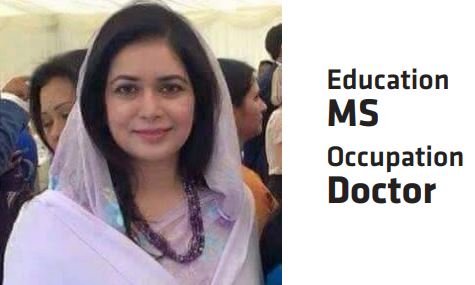
Family Background
Zubaida Rahman was born in Sylhet, Bangladesh. Her father, Rear Admiral Mahbub Ali, was the chief of the Bangladesh Navy during the rule of President Ziaur Rahman. He served as Minister of Communications and Agriculture in the government of Hussein Muhammad Ershad.

Mirza Fakhrul Islam Alamgir (74 years)
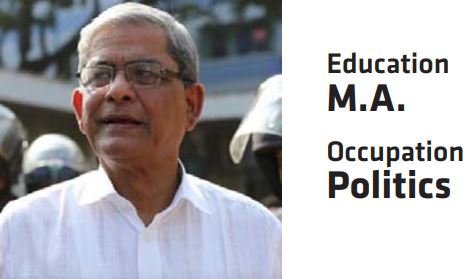
Political Career Highlights
Alamgir was active in student politics at Dhaka University. He ran for chairman in Thakurgaon municipality in the 1988 municipal elections as a neutral candidate, and won. Alamgir joined BNP in the early 1990s. In 1992, Alamgir was nominated as president of BNP’s Thakurgaon district unit. From 2011 to present, he is performing as Secretary General of BNP

Gayeshwar Chandra Roy (71 years)
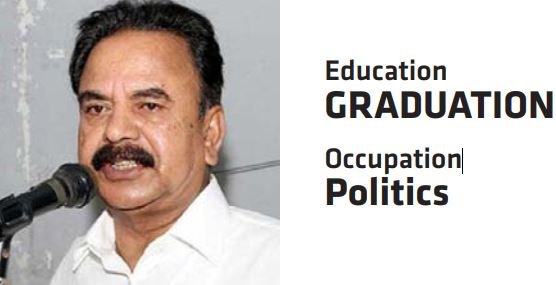
Political Career Highlights
In 1970’s, he was a member of Jatiya Samajtantrik Dal. He joined ‘Jatiyatabadi Jubo Dal’, a political wing of the BNP in 1978. After the 5th parliamentary election in 1991, Roy was made State minister for Environment and Forest. Later, he was appointed as one of the Joint Secretary Generals of BNP and then member of the Standing Committee.

Mirza Abbas (71 years)
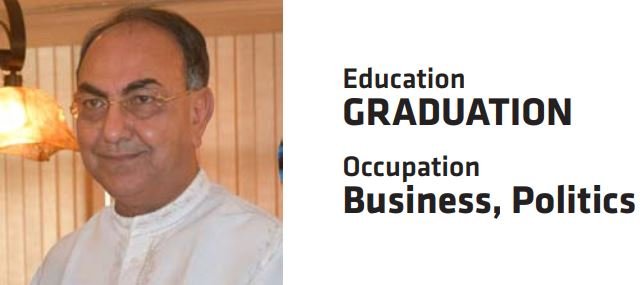
Political Career highlights
He was the Mayor of Dhaka City Corporation from 1991 to 1993. He was the Member of Parliament (MP) for Dhaka-6 from 2001 to 2006, and Minister of Housing and Public Works in Khaleda’s cabinet. He was also nominated candidate from BNP for Dhaka North City Corporation Election in 2015.

Ruhul Kabir Rizvi (71 years)
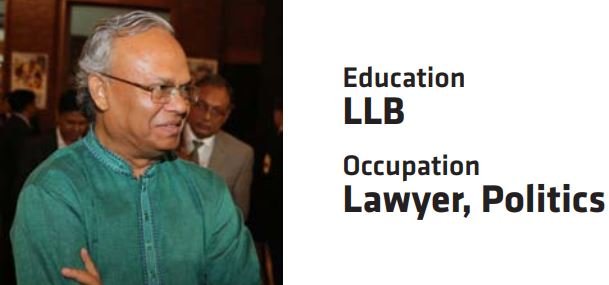
Political Career highlights
Rizvi entered student politics through an organization named “Leftist Revolutionary Student Union” while studying in Rajshahi University. He then joined Bangladesh Jatiotabadi Chatra Dal and later became its central president in 1989. He was elected BNP’s senior joint secretary general on 19 March 2016. From then he is performing as the spokesperson of the party most of the time.

Amanullah Aman (60 years)
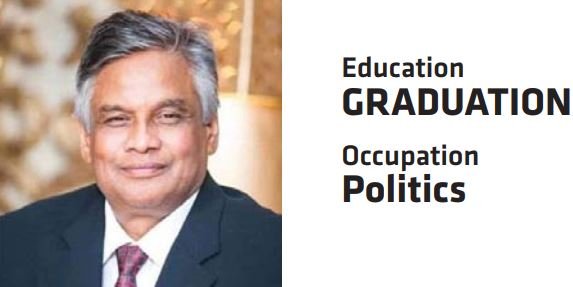
Political Career Highlights
He was the VP of DUCSU 1990. He was elected as the Member of Parliament (MP) for Dhaka-3 at 1993, 1996 and 2001 parliamentary election. He also served as the state minister of health and later labor and employment. He is the former General Secretary of Dhaka District unit of BNP & convenor of Dhaka North BNP

Dr. Khandaker Mosharraf Hossain (76 years)
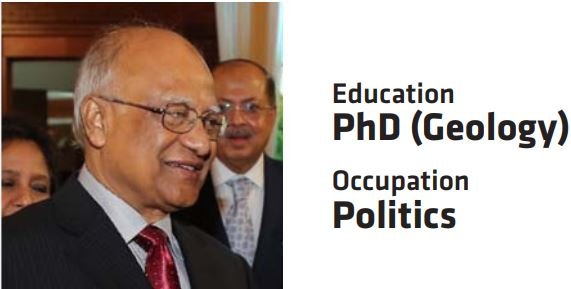
Political Career Highlights
Khandaker Mosharraf has been a member of the Standing Committee of BNP since 1994. He was elected as a member of parliament for four terms since 1991. He was the Minister of Energy and Mineral Resources, Home Affairs, & Health and Family Welfare while BNP was in Power

Rumin Farhana (40 years)
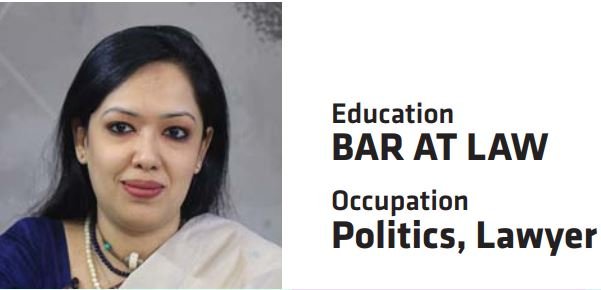
Family Background
In 2019 she got the nomination of BNP for the seats reserved for women in the national parliament.

Ishraque Hossain (33 years)
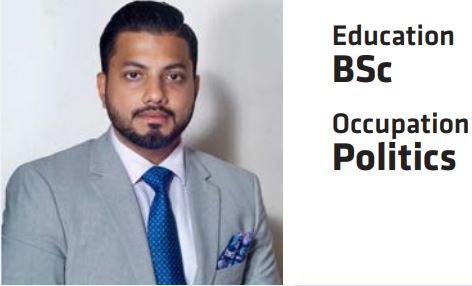
Political Career Highlights
BNP Nominated Mayor Candidate at Dhaka South City Corporation election, 2020. He is popular among youth.

PROBABLE CATALYSTS TO STRENGTHEN OPPOSITION ELECTION ALLIANCE
Dr Mohammad Yunus (81 years)
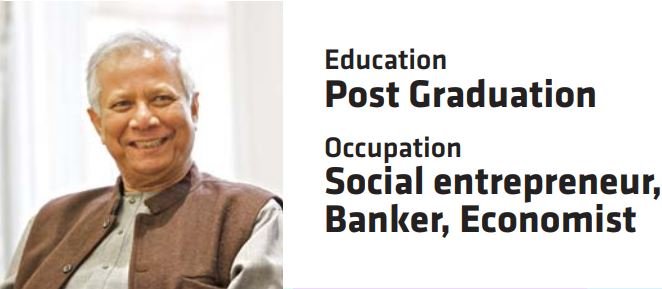
Political Career highlights
In early 2006 Yunus, along with other members of the civil society participated in a campaign for honest and clean candidates in national elections. He considered entering politics in the later part of that year. On 3 May, however, Yunus declared that he had decided to abandon his political plans following a meeting with the head of the interim government, Fakhruddin Ahmed.

Dr Colonel (Retd) Oli Ahmed (83 years)
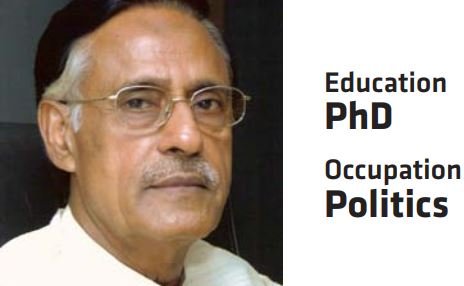
Political Career Highlights
Oli Ahmad is highly regarded as one of the key founding members of the Bangladesh Nationalist Party (BNP). On 26 October 2006, Ahmad and several other senior leaders of the BNP defected to form the Liberal Democratic Party.

Dr Reza Kibria (61 years)
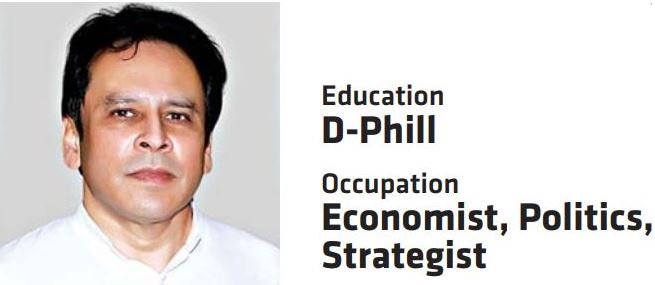
Political Career Highlights
Former secretary genaral of Gono-Forum. Currently performing as convenor of Gono Parishad. Son of Shah A M S Kibria, former Finance Minister, veteran leader Bangladesh Awami League.

